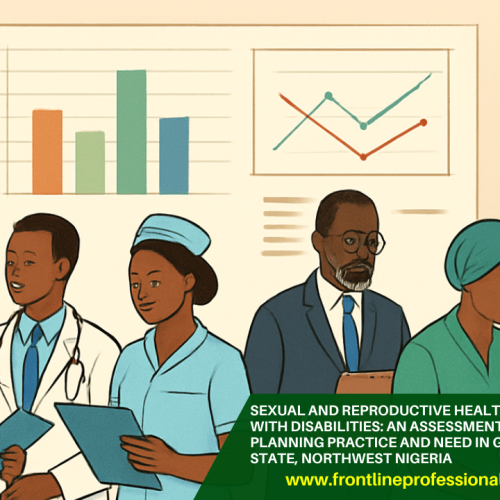Petters, Ememobong Sunday, Afiong Oku, Olugbemi Motilewa, Okon Ubong
Citation: Petters, Ememobong Sunday, Afiong Oku, Olugbemi Motilewa, Okon Ubong (2024). Prevalence of depression among adults living with HIV/AIDS in urban-rural northwest senatorial district, Akwa Ibom State, Nigeria. Frontline Professionals Journal, 1(1), 168 – 190.
ABSTRACT
Background: Human Immunodeficiency Virus and Acquired Immunodeficiency Syndrome (HIV/AIDS) is an important public health issue, leading to significant morbidity and mortality especially in low- and middle-income nations. In recent times, people living with HIV (PLHIV) have experienced an increase in life expectancy. Despite the attainment in longevity, neuropsychiatric disturbances, such as depression remains an important health issue of concern among people living with HIV/AIDS (PLHIV) that negatively affects their quality of life and treatment outcomes. Mental health disorders are among the most prevalent co-morbidities in PLHIV, and depression is the most common neuropsychiatric disorder among PLHIV. Disparity in the place of residence (urban and rural) is a contributory factor to the rising prevalence of depression in PLHIV. In our environment, clinical assessment, and care of depression in PLHIV have not received the necessary attention. Thus, the need to bring to the fore the magnitude of this problem and the associated factors of depression in PLHIV.
Methods: We conducted a hospital-based comparative cross-sectional study using a mixed methods approach for data collection. The quantitative component involved 693 adults living with HIV (349 urban and 344 rural) who were receiving treatment at four selected health facilities (2 urban and 2 rural) in the northwest senatorial district of Akwa Ibom State. A multi-staged sampling technique was employed for selecting the Local Government Areas (LGAs), study sites, and participants. Data were collected using an interviewer-administered semi-structured questionnaire to assess the prevalence of depression and adherence to antiretroviral medications. Depression was measured using the Hamilton Depression Rating Scale, while adherence was evaluated using the Brief Medication Questionnaire self-report tool. Descriptive statistics, including frequencies, proportions, medians, and interquartile ranges, were
used to summarize the data, with findings presented in tables and charts. Chi-square tests and Fisher’s exact tests (for cells with values less than 5) were applied to examine associations between categorical variables. Differences in means were assessed using t-tests, and non parametric tests, such as the Mann Whitney U test, were used where appropriate. The level of significance was set at 5%
Results: The study found that respondents aged 31-35 years were the largest age group, with rural respondents having a slightly higher median age than urban ones, though not statistically significant. A higher proportion of urban respondents were married, traders, and earned less than 10,000 naira monthly, while rural respondents had more unemployment, widowed individuals, and household members with HIV. A total of 258 (37.2%) respondents were depressed with the significantly higher prevalence in rural areas (47.1%) than urban areas (27.5%) (p<0.001), with rural respondents more likely to have severe depression. Logistic regression revealed income, living conditions, side effects from ARTs, and prior perceived depression as significant factors associated with depression in both rural and urban areas. Models explained 24% of variation in urban areas and 44.8% in rural areas.
Conclusions: The prevalence of depression among PLHIV was high, with those from rural facilities being significantly higher. The recommendation to the government and health authorities is that mental health services should be included as a core component of HIV/AIDs care and treatment services in Akwa Ibom State. Awareness and sensitization against stigma and discrimination of PLHIV need to be increased among the general population.
Keywords: HIV/AIDS, Depression, People living with HIV, Adherence, Urban, Rural







